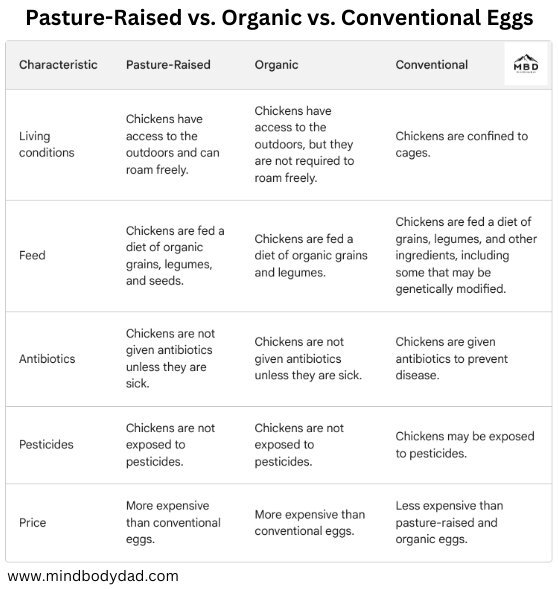What Are The Healthiest Eggs: Pasture-Raised, Free-Range, or Organic?
Eggs are versatile, nutrient-dense, and delicious. It makes sense why the average American eats 277 of them a year.
Even the innocent egg, however, doesn’t come without controversy (heart healthy or heart attack causing?) and confusion (pasture-raised, organic, free-range, conventional?).
We’ll get all of this straightened out as we look to the evidence and breakdown the best and the healthiest type of egg to eat.
The Health Benefits Of Eggs
Eggs are one of the most nutrient-dense foods that exist. They’re known for their high protein content (about 6 grams per egg). They are also a good source of vitamins and minerals, including vitamin B12, vitamin D, vitamin A, selenium, and choline. (About 90% of Americans don’t get enough choline in their diet.) These nutrients are important for maintaining healthy bones, supporting immune function, promoting healthy vision, and much more. (Just make sure you’re cooking them right.)
Here’s the breakdown of the nutritional profile of a large egg:
Calories: 72
Protein: 6.5 grams
Fat: 4.8 grams (most of which is in the yolk)
Carbohydrates: 0.6 grams
Cholesterol: 186 milligrams (found only in the yolk)
Sodium: 71 milligrams
Potassium: 69 milligrams
Vitamin A: 75 micrograms
Vitamin B12: 0.6 micrograms
Vitamin D: 16 IU
Vitamin E: 0.5 milligrams
Vitamin K: 0.1 micrograms
Folate: 22 micrograms
Calcium: 28 milligrams
Iron: 0.9 milligrams
Magnesium: 6 milligrams
Phosphorus: 86 milligrams
Zinc: 0.6 milligrams
Selenium: 15.8 micrograms
Another potential health benefit of eggs is their positive impact on heart health. For years eggs were vilified due to their cholesterol content but, with more recent evidence, some studies have even suggested that eating eggs may be associated with a lower risk of heart disease. More on this later.
The Controversy: Are Eggs Good Or Bad?
Eat eggs. Don’t eat eggs. Eat eggs but just the whites. Nope, just stop eating them.
What?!
While the egg hasn’t changed much, our understanding of nutritional science has (somewhat). The long and short of it is that studying nutrition is difficult, the government has made some erroneous claims in the past, and widely adopted trends (low-fat = good, cholesterol = bad, etc.) are difficult to reverse.
With all of that aside, let’s look at the best research.
This systematic review and meta-analysis of 8 prospective cohort studies looked at the relationship between egg consumption and diabetes and heart disease. They found that consuming up to one egg per day was not associated with an increased risk of cardiovascular disease or diabetes.
Another meta-analysis published in the British Medical Journal (BMJ) reviewed 17 prospective cohort studies to determine the effects of egg consumption on heart health. They found that consuming up to one egg per day was not associated with an increased risk of coronary heart disease or stroke.
Even the FDA couldn’t ignore the data. In 2022 the FDA revised their dietary guidelines so that they don’t limit dietary intake of cholesterol (which has been shown to have little effect on your actual cholesterol) and they now deem eggs a “healthy food.”
Okay, eggs are good. Now, which ones do I buy?
The Best Types Of Eggs: Pasture-Raised, Organic, Free-Range, or Conventional?
Let’s look at the standard ol’ egg first, a.k.a. conventional egg. Conventional eggs come from chickens who spend their lives in an indoor cage the size of a sheet of paper (67 square inches). These birds lack the opportunity to socialize, spread their wings, or walk which leads to a lower quality of life and less nutritious eggs. Their food tends to be limited to grains that contain GMOs, toxic pesticides, and antibiotics.
Chickens who are pasture-raised are given at least 108 square feet of outdoor space with vegetation to roam around in. They’re outdoors for 6 hours a day compared to their caged compadres who get only indoor space in a cage about the size of their body.
A 2007 study found that pasture-raised eggs had a much better nutritional profile compared to conventional chickens. The pasture-raised eggs contained twice the omega-3, 3 times the vitamin E, and 7 times more beta-carotene.
The next best option is free-range which means each bird has 2 square feet of space and the option to get outside for 6 hours a day, however, this space doesn’t have to have vegetation. A 2014 study found that free-range eggs had 3-4 times more vitamin D than conventional chickens.
Choosing organic means the chickens are fed a vegetarian diet that doesn’t contain pesticides or GMOs. It also means that antibiotics aren’t used unless medically necessary. Organic also means that have access to outside but there are no standards for the amount of time, size or type of area, etc. This study found that conventional chicken had arsenic levels that were 4 times higher than organic chickens. (Source and source)
To take it a step further, find out if your FoodPrint is a group that brings awareness to food’s “impact on the environment and on the welfare of animals, food/farm workers and on public health.” According to FoodPrint, eggs with these labels (e.g. “Animal Welfare Approved,” “USDA Organic”) have the highest standards.
The Verdict
The best choice for the healthiest eggs is organic, pasture-raised eggs. Second place is free-range.




